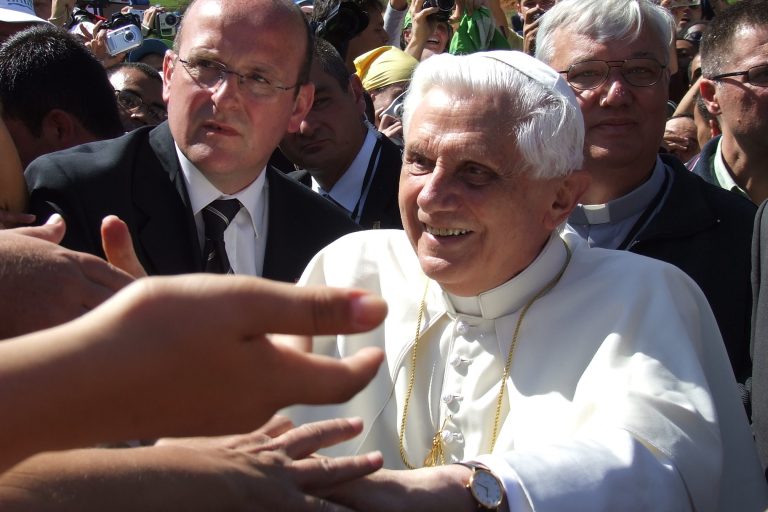BLOG: Pope Benedict & ACN

“Let men know that God is there for us as a loving Father.”
THE urgent, yet timeless words of the late Pope Emeritus Benedict XVI to Aid to the Church in Need (ACN) in 2007 continue to be heard and pondered in our time. As the German Pope told the international charity during the Angelus that September, “Where God dwells in the hearts of men, there peace and social justice can grow. Let us be instruments of God’s love in our world”.
Charities are often considered to be primarily social enterprises which aim to raise the standard of living. They are praised for providing material benefits to society’s poorest and most vulnerable, frequently in the form of money, food, clothing or emotional support. Yet ACN’s commitment to offering emergency help to the persecuted Church was not what impressed Benedict the most.
A few years before his election as Pope, he said:
“I support [ACN] because I know it is really doing a service to faith. Many think that you can only support social work in the narrow sense of the word, that you should leave it up to each person what they believe.
“But in reality, nothing is more important than bringing God to people, helping them to find Christ, because only then do the powers of faith awaken, which are the decisive form of energy for world history.”
Aid to the Church in Need, he insisted, “meets the need for faith, and thereby does what is most necessary for our world.”
As ACN responded to the challenges facing persecuted Christians during the years of Benedict’s Pontificate, the charity became an increasingly vital instrument in the Church’s spiritual mission on earth: to bring the Good News of our salvation in Christ to all the ends of the earth. As Benedict blessed the charity with Pontifical Foundation status in 2011, its mission formally became the mission of the Church.
ACN’s spiritual mission is accomplished in numerous ways, such as by funding catechetical projects, distributing written materials such as the Child’s Bible and YOUCAT, providing Mass stipends and rebuilding churches.
Central to Benedict’s thought, and a teaching that has stayed with the charity since his days as Pope, was that Aid to the Church in Need’s apostolate lay precisely in its recognition that the spiritual works of mercy are at least as important as the corporal works of mercy. Many of the families, priests, religious and faithful ACN has helped over the course of the last 75 years have repeatedly asked us for more spiritual help. And so it is that the charity has ensured that their churches are rebuilt, their Bibles distributed and their sacramental life nourished. From Cuba to Nigeria and from Lebanon to China: the needs of the Body of Christ are one and the same yet expressed in a variety of ways according to the demands of time and place.
It is specifically the most vulnerable whom ACN serves – and often the most hungry – who are the first to ask that their spiritual hunger is satisfied. Those who need physical food the most are precisely those requesting the spiritual food of the Sacraments, the Word of God in the Scriptures, and much-needed infrastructure for the local Church community.
The Middle East provides the clearest example of this growing spiritual need. At Benedict’s direct request to ACN in 2007, the charity bolstered its pastoral support for the persecuted Christians of war-torn countries such as Lebanon, Iraq and Syria. Writing on Benedict’s behalf, Vatican Secretary of State Cardinal Tarcisio Bertone said there are church communities in the Middle East which “are today threatened in their very existence…forced to live to a large extent without pastoral support, who are either forbidden altogether, or permitted only under severe limitations, to communally and publicly profess their Faith”.
The Pope’s call to stand with persecuted Christians in the Middle East was to become the defining focus of the charity’s mission over the next 15 years. As the Arab Spring gave way to genocidal violence carried out by militant Islamist movements, the charity’s critical task was to provide spiritual – as well as material – support for Christians under existential threat.
Since 2011, ACN has supported projects in Syria totalling around €42 million and has completed 354 building projects in Iraq, leading some to consider ACN’s work as vital to the continued presence of the Church in the lands where Our Saviour lived and walked. I, in common with many ACN staff, volunteers and others have seen at first hand the astonishing fruits of this super-human effort to ensure the survival of Christianity in its ancient heartland.
There is a seamless interaction between the charity’s corporal and spiritual works. This interaction is necessary, for “what profit is it to a man if he gains the whole world, and loses his own soul?” (Mt 16:26).
Benedict’s words of thanks in September 2007 can only serve as a stimulus for ACN’s present work: “Dear friends, be assured of the gratitude and the prayers of the Successor of Peter for your work, which is an eloquent testimony to the love of God. Please continue in future to let men know that God is there for us as a loving Father”.
The passing of Benedict XVI marks not the end of ACN’s mission but rather its renewal, as through his inspiration and intercession the charity sets its mind not on things of the earth, but on the things above (Col 3:2).
